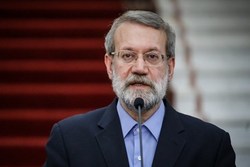 Iranian Parliament Speaker Ali Larijani, in a meeting with Omani Foreign Minister Yusuf bin Alawi bin Abdullah in Tehran on Sunday, said that his country’s strategy is focused on upholding security and peace in the Persian Gulf region.
Iranian Parliament Speaker Ali Larijani, in a meeting with Omani Foreign Minister Yusuf bin Alawi bin Abdullah in Tehran on Sunday, said that his country’s strategy is focused on upholding security and peace in the Persian Gulf region. RNA - “Security is achieved by the countries of the very same region and trans-regional countries’ interference can lead to unpredictable dangers,” Larijani said at the meeting with bin Alawi.
“Some countries must change their behavior to achieve a stable security because their current behavior is disrupting the region. The regional capacity is limited and it cannot go on with the prolonged war in Yemen,” the top lawmaker added, referring to 5-year long aggression of Saudi Arabia and the UAE against Yemen.
Larijani further noted the seizure of an Iranian oil cargo by London in the Strait of Gibraltar, and questioned the cost-benefit rationality behind the move, reminding that the UK had already voiced opposition to the United States' anti-Iran policies.
After US President Donald Trump unilaterally withdrew Washington from the nuclear deal of 2015, officially known as the Joint Comprehensive Plan of Action (JCPOA), Iran remained in the treaty because of the commitments and promises made by the UK, France and Germany, Larijani said, adding that now it is unknown why London joined the US in its anti-Tehran pressures with pirating an Iranian oil tanker in the Strait of Gibraltar.
“Why was the Iranian tanker stopped?” Larijani asked, adding that it is unclear what benefits the British are seeking with “pirating the Iranian tanker”.
Oman’s top diplomat, for his part, stressed that Tehran and Muscat are pursuing the same objective in the region which is stable security.
“We rest assured that Iranians are wise and we hold that Iran is playing a very important role in contributing to the security of the region,” bin Alawi, highlighted.
The Omani foreign minister arrived in Tehran on Saturday and met with his Iranian counterpart Mohammad Javad Zarif.
Zarif and Yousef bin Alawi reviewed the latest developments in bilateral relations and regional and international issues.
During the meeting, the two top diplomats discussed the trend of cooperation between the two countries, stressing the importance of continued consultations between Tehran and Masqat.
Iran and Oman have had good political and economic relations from old times and the ties have even expanded in recent years due to extended banking cooperation between the two countries.
Earlier this month, Omani Minister of Transport and Communication Ahmed bin Mohamed al Fatisi said that his country was resolute to invest in Iran’s Southeastern port city of Chabahar to further expand maritime cooperation between Tehran and Oman.
In a meeting with Rahmani, al Fatisi voiced readiness of his country for investing in Chabahar development projects, and emphasized the importance of being active in the maritime field.
According to Fars News Agancy, the Omani side pointed to the brotherly and friendly relationship between Iran and Oman, and emphasized on the need to strengthen transportation and infrastructural cooperation as well as presenting facilities in line with promoting bilateral trade volume.
Development of relationship with neighbors, specially Islamic Republic of Iran, is the main policy of Omani government, he said, adding, “We welcome any strategy for promoting and developing bilateral relationship warmly.”
The Omani minister referred to the infrastructural facilities of his country in the field of launching air and sea transport lines, and stated, “Now, air routes have been established between the two countries and it is necessary that trade and business activists should boost their activities in maritime field.”
For his part, Rahmani, said, “Activating Ashgabat Agreement and cooperation of Oman in North-South Corridor with the aim of using port and rail capacities between the two countries as well as accessing Central Asian market have been considered as one of the main objectives behind development and promotion of bilateral relationship.”
The Iranian minister pointed to the high potentials and capacities of Iranian cities including Chabahar and Bandar Abbas, and added, “Islamic Republic of Iran attaches great importance to its relations with neighbors, so that the country thinks to this issue as a win-win and strategic tie.”
847/940